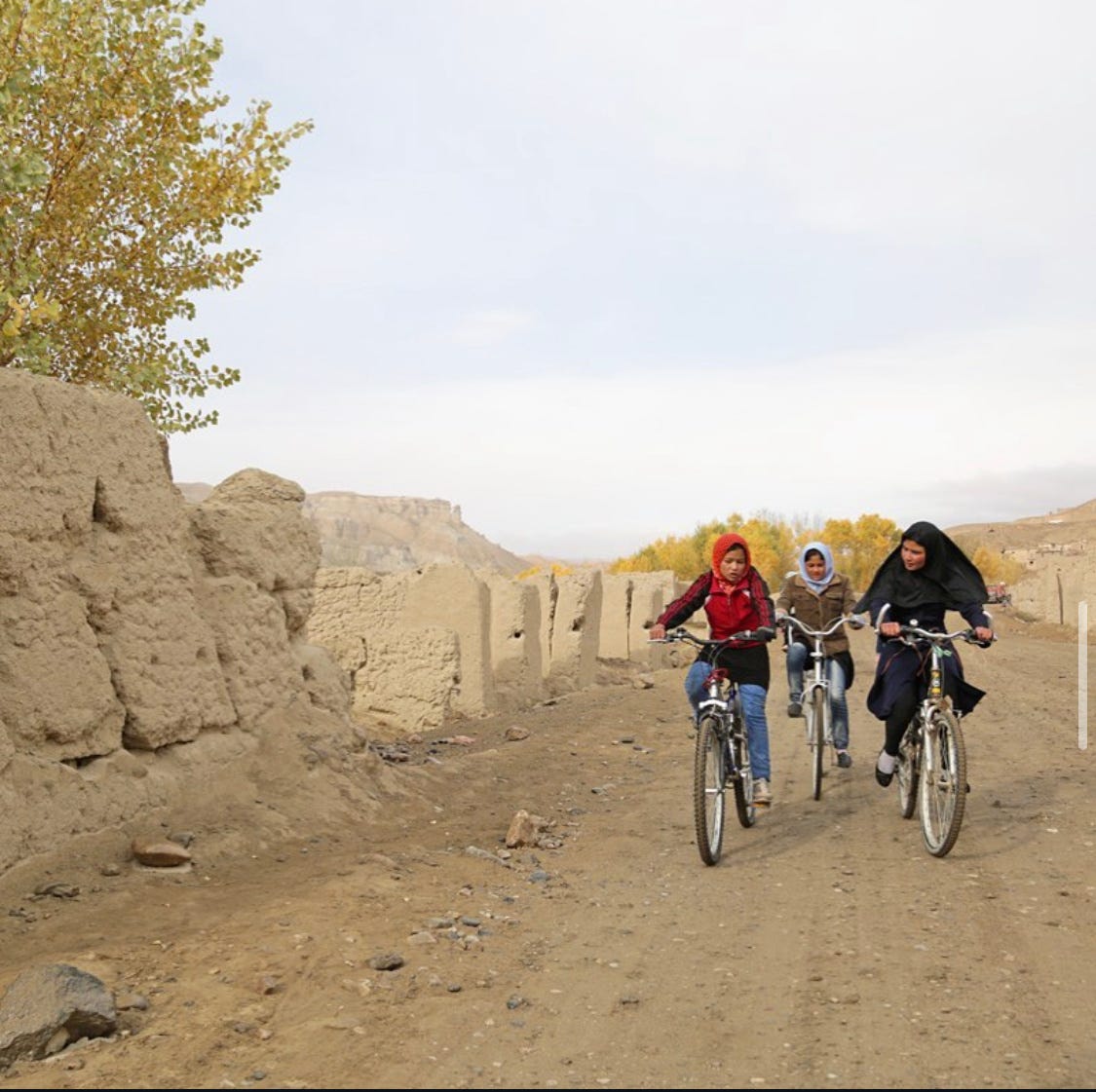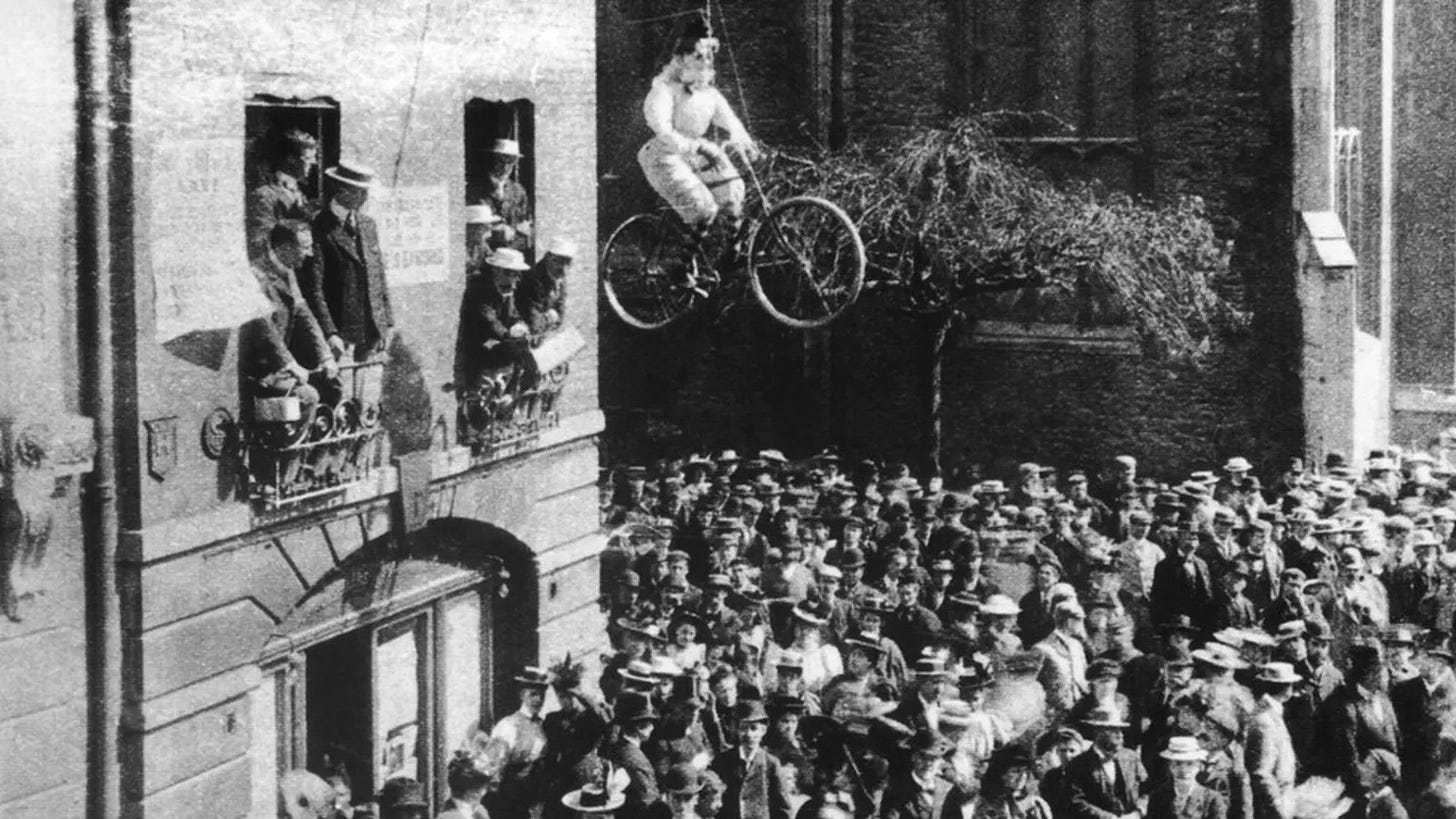The Call
After twelve years, a documentary, and an evacuation, a video call to start preserving cycling history
Almost twelve years after I first saw Tahera's face in a now-iconic photo taken on the second film production trip for the documentary Afghan Cycles, I had my first phone call with Tahera.
In the twelve years that had passed, I had been to Bamyan several more times to ride with her friends and teammates. I had brought the Afghan National Team to her town in hopes of introducing the Federation president and coach to the Bamyan women's team founder and leadership, with the goal of expanding the Federation's support. I had donated bikes and gone mountain biking, cycling, and hiking around the province's outstanding mountain landscapes and iconic cultural and architectural monuments.
She was the film production crew's favorite character, and the director fought for her inclusion in the documentary until the end. In many of the production photos posted online, she's riding in a red headscarf, like the photo below taken by Jenny Nichols.

However, with three different teams being documented over five years and the decision made to focus on the storyline of one cyclist who had escaped Afghanistan as the central point, many storylines were cut, including Tahera's. But she was always in our hearts. That's how powerful and joyful her interviews were. She was one of the youngest and one of the most determined. She wanted to be Afghanistan's ambassador to China when she grew up. She and her brother were the first in her family to get a formal education. Yet her father was extremely well-read and self-educated. I can see how this sparked Tahera's interest in oral history. Tahera followed her brother to Bamyan, the rural capital of the province, where she met Zahra and Zakia, the founders of the women's team and together with Zahra Abbasi and a few other friends, they became the first women's team in Bamyan, and the first women-founded and women-led team in Afghanistan's history.
When the evacuations began, Tahera was safe in Morroco, finishing her university degree in international relations. But her family was in Bamyan. Due to Tahera's exposure and involvement with Afghan Cycles, I felt an obligation to help them, along with the others. I was able to evacuate eight of them to Pakistan, safeguard them for a year, and get them onto a humanitarian flight to Italy for asylum. Tahera is now in the US. She was accepted into a master's program in oral history at Columbia. Still, she was unable to secure a scholarship, and she is a new refugee in the US with limited resources. That makes accepting the master's program unattainable. For the moment.
Tahera and I began communicating again. The first time since the evacuations had finished. Tahera and I had never met. Every time I was in Bamyan and met the team to ride, she was in school or away. Our first call was over three hours. We were talking over each other like old friends, both in shock we had never actually met, despite our connections. We felt like we had always known each other. It was a rare and beautiful thing. And to begin working together on a project based in hope, is even more beautiful.
And now - after all that - we are working together on one of the most important projects of my career. The Afghan Women's Cycling Archive. A creative and historical archive of the Afghan cycling revolution that spanned a decade but has roots pre-Taliban. Tahera will spearhead and lead the collection of oral histories from the cyclists scattered across the diaspora and the few who remain in Afghanistan. We have photo and film archives from multiple sources to gather. News media, film, and book publications have all documented these women, and unique artifacts exist both within and outside Afghanistan. Much has been lost, destroyed, or abandoned during the evacuation, but much has been hidden or saved. This history is vital for preserving the identity not just of the women involved as cyclists but for the identity of future Afghan women and girls and of Muslim women everywhere.
Imagine if the imagery and stories of US and UK suffragettes on bikes didn't exist. The way my peers and I would engage with bikes and our own identities would be radically different.
Our history shapes our future selves. Afghan women have already lost so much of their history, much of it a modern and radical version that was largely destroyed by the first Taliban regime. That was saved helps shape a rounder, fuller story of who Afghan women and Afghan society truly are. They are a piece of the larger story of Muslim women, and that must not be allowed to be erased. This goes far beyond this incredible group of young women. It was the men who supported them. It is the culture that changed around them. It is the ripple effect of change that continues as two sisters, Yuldoz and Fariba Hashimi, from the remote northern province of Fayrab, rode in the Paris Olympics and Masomah Alizada, who was one of the original national team cyclists, carried the Olympic torch in her role as the Chef de Mission of the Olympic Refugee Team.
I spent a considerable amount of time in the Afghan archives in Kabul at ACKU, which was founded by the late Nancy Dupree. I was honored to call her friend and to share many meals with her. Our last was in the gardens behind Hiromi's Japanese restaurant, where we discussed the cyclists. Nancy had never learned to ride a bike, and she was curious about the cyclists. She wanted to come to meet them. I teased that perhaps they could teach her to ride a bike, and she agreed. This was the last time I saw Nancy; she never got to meet the cyclists. Nancy's work, preserving Afghan history and storytelling, has always guided my own. The heart of her work was curiosity and love for Afghanistan. My own two published books on Afghanistan and the entire Streets of Afghanistan exhibition were donated to the archive.
This archive project needs your help. As we work to secure grants and sponsors for this project and its culmination with public museum exhibitions, we need funding. This will support the start of this 3-5 year project including funding the work of Tahera and another Afghan athlete I evacuated, who is now in France and whom you'll soon meet.
Afghans will lead this project. As they should. This was their revolution, and this is their legacy. I was there for many years, riding with them, meeting them, supporting them. Clubs and teams that never met. I know where many of them are now and can connect the threads between cyclists who never knew each other but whose individual stories are part of history. You can ensure that history is preserved by supporting the patreon here!





